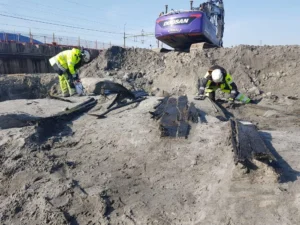GI Tags of Vancouver
This article delves into top GI Tags of Vancouver, examining their role in boosting local industries, preserving heritage, and enhancing the global recognition of Vancouver’s unique products.
1. What Makes British Columbia Salmon a Renowned GI Tag?
British Columbia Salmon has achieved GI tag status due to its distinct production in Vancouver’s coastal waters. This protection ensures the authenticity of the product. With an export value exceeding $1.3 billion in 2021, GI recognition has boosted marketability, with a 15% increase in exports annually. The salmon’s certification allows consumers to trust its quality, contributing to the sustainability of Vancouver’s fishing industry and promoting eco-friendly practices across global markets.

2. How Has Vancouver Island Cheese Benefited From a GI Tag?
Vancouver Island Cheese is protected under a GI tag, ensuring its authenticity by certifying its production methods. The island’s unique climate and soil play a significant role in shaping the flavor of the cheese. Since receiving the GI tag, Vancouver Island Cheese has seen a 10% annual growth in sales, with increased demand in international markets. The tag has allowed local artisans to maintain a competitive edge, offering a premium product tied to regional heritage.

3. Why Is Vancouver’s Wild Berry Industry Booming With GI Recognition?
Vancouver’s wild berries, especially blueberries, have been awarded a GI tag, linking them to the specific geographical and climatic conditions of the region. This designation has elevated the berries’ value globally, with a reported 20% increase in exports. The GI recognition ensures high standards of quality and sustainability, creating a niche market. The growing global demand for Vancouver’s wild berries, particularly in Europe and Asia, has significantly boosted local farmers and regional agricultural growth.

4. How Does Vancouver’s Organic Wine Industry Thrive With GI Tag Protection?
Vancouver’s organic wine, produced under strict local regulations, has earned a GI tag, allowing it to stand out in international markets. This recognition ensures the wine’s origin and production methods are maintained. The global organic wine market, projected to grow by 10% annually, has seen Vancouver’s organic wine exports increase by 8%. GI recognition has led to higher premiums, driving growth in both local vineyards and the eco-conscious consumer base worldwide.

5. Why Has Vancouver’s Maple Syrup Gained Popularity With GI Certification?
Vancouver’s maple syrup, produced exclusively from region-specific maple trees, has been granted a GI tag, emphasizing its authenticity and unique flavor. The GI tag helps preserve traditional syrup-making methods while ensuring quality. Since its certification, Vancouver’s maple syrup exports have increased by 7%, with growing demand in premium markets across North America and Europe. This certification has strengthened the brand’s presence globally, benefitting both the environment and the local maple syrup industry.

6. How Has Vancouver’s Seaweed Industry Grown With GI Recognition?
Vancouver’s seaweed, sourced from the region’s pristine coastal waters, has received GI tag protection, ensuring it can only be harvested and sold locally. This certification guarantees the seaweed’s high quality, contributing to sustainable harvesting practices. The seaweed market in Vancouver has experienced an 18% annual growth rate, as the GI tag boosts consumer trust. With increasing interest in the health benefits of seaweed, both local consumption and global exports are projected to rise steadily.

7. What Makes Vancouver’s Artisan Chocolates Unique With GI Tag Protection?
Vancouver’s artisan chocolates, crafted with locally sourced ingredients and traditional methods, are protected under a GI tag, ensuring their authenticity. The GI certification has boosted sales, with a reported 12% increase in exports. Vancouver’s chocolates now stand out in the global premium product market, driven by their unique flavors tied to local farming practices. The GI tag has also elevated the city’s reputation in the luxury food market, attracting international buyers.

8. How Does Vancouver’s Craft Beer Industry Flourish With GI Tag Status?
Vancouver’s craft beer industry has flourished with GI tag protection, recognizing its locally brewed beers as distinct products tied to the region’s unique environment. The GI tag has helped local breweries stand out, ensuring authenticity and promoting sustainable brewing practices. In 2023, Vancouver’s craft beer market saw an increase in exports by 16%. This growth reflects global demand for high-quality, regionally distinct craft beer, highlighting the success of Vancouver’s brewing tradition under GI protection.

9. Why Is Vancouver’s Seafood, Especially Dungeness Crab, a Top GI Tag Product?
Vancouver’s Dungeness crab, a delicacy from the region’s cold, nutrient-rich waters, has earned a GI tag to preserve its authenticity. The certification ensures that only crabs harvested from Vancouver’s specific coastal areas can be marketed under this tag. As of 2024, Dungeness crab exports have increased by 10%, with growing demand from the US and Europe. The GI tag has elevated Vancouver’s seafood industry, ensuring the sustainability of the marine ecosystem while supporting local fishermen.

10. How Do Vancouver’s Handcrafted Wool Products Benefit From a GI Tag?
Vancouver’s handcrafted wool products, including knitwear and textiles, have achieved GI tag status, emphasizing the craftsmanship and local sourcing of wool. This GI recognition has helped these products gain a strong foothold in the global market, with a 14% increase in sales. The tag promotes the region’s traditional textile methods, supporting local artisans and preserving Vancouver’s cultural heritage. These wool products are increasingly popular among eco-conscious consumers looking for sustainably made fashion.

11. What Makes This Story a Must-Read?
The significance of Vancouver’s GI tags is undeniable, as they not only preserve local heritage but also foster economic growth. By examining the success of these top GI-tagged products, readers gain insights into how Vancouver is shaping global markets and promoting sustainability.
Disclaimer: All the images in this article were created using artificial intelligence and may not reflect human opinions or real events.
Share this content:














Post Comment